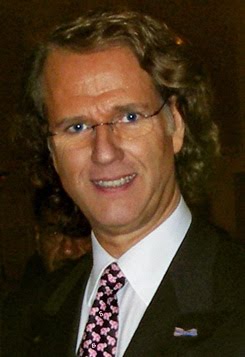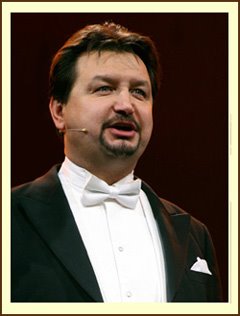The "Real" André Rieu (1917-1992)
.
From "The Limburger" - May 12, 2017 By Wim Doesborgh:Today, May 12th, is exactly 100 years ago that André Rieu was born. Senior to be exact, father of the successful Waltz King. Where Junior shines in the light genre, senior was superior in the serious classical level.
André Anthony Rieu was not an easy person. Not for his 6 children and not for the members of the Limburg Symphony Orchestra. In the archives of the orchestra the 'Rieu Period' (1949-1980) is described as "rich in conflicts", where the conductor besides friends also had strong enemies. Rieu was a professional with a huge knowledge of music, and set expectations of others very high.
In multiple interviews, Rieu Junior, the leader of the Johann Strauss Orchestra, told how he tried to get out from underneath the pressure of his father, because he did not, according to his father's will, wanting to become a violinist in the "heavy, serious music genre". In his experience the upbringing at home was emotionless, strict and old-fashioned. "My wife, Marjorie, with her faith in my ideas about music, finally freed me from Beethoven," Rieu once told a French newspaper.
Nevertheless, the music world scarcely benefits by Rieu senior when he is only remembered for his strict guidance. If he is to be remembered anyway, then Rieu Junior's crushing success almost completely blows away the "real" André Rieu. And that's not right.
Leipzig
Rieu senior (born in Haarlem and a descendant of a family who came to the Netherlands in 1831), was a big name in the classical music world. He studied piano and orchestra management at the conservatories of Utrecht and Amsterdam. He conducted the "Omroep Kamerorkest"(Broadcast Chamber Orchestra), came to Maastricht in 1949 and was connected to the Leipzig Opera for a while. With the later he conducted amongst others Debussy's "Pelleas et Melisande" and Wagner's "Die Meistersinger von Nürnberg". Because of his erudition and enthusiasm he was a welcome guest with other orchestras in the Netherlands, Belgium, Germany and Poland and he performed as a guest conductor with big orchestras in London, Vienna, Paris and Athens.
 In 1957 along with some other prominent musicians from
the Amsterdam music scene, he established the Amsterdam Chamber Orchestra. There
he worked together with celebrities like Herman Krebbers, Gustav Leonhardt,
Frans Brüggen, Albert de Klerk, Hubert Bahrwasser, and Hans Henkemans. Artistic
tensions, like in Maastricht did not exist. Rieu performed there with musicians
of the same high caliber and felt in his element. That can clearly be heard on
the recordings available at that time and which in part are available again on
CD. They let you hear Rieu in delicate piano concerts by Mozart (with
Henkemans), lively organ concerts by Händel, exemplary violin concerts by Haydn,
and the for that time very expeditionally played music by Vivaldi, Telemann and
Emanuel Bach. And then of course the Bach-cantates, including the charming Jagd
(hunting) cantate.
In 1957 along with some other prominent musicians from
the Amsterdam music scene, he established the Amsterdam Chamber Orchestra. There
he worked together with celebrities like Herman Krebbers, Gustav Leonhardt,
Frans Brüggen, Albert de Klerk, Hubert Bahrwasser, and Hans Henkemans. Artistic
tensions, like in Maastricht did not exist. Rieu performed there with musicians
of the same high caliber and felt in his element. That can clearly be heard on
the recordings available at that time and which in part are available again on
CD. They let you hear Rieu in delicate piano concerts by Mozart (with
Henkemans), lively organ concerts by Händel, exemplary violin concerts by Haydn,
and the for that time very expeditionally played music by Vivaldi, Telemann and
Emanuel Bach. And then of course the Bach-cantates, including the charming Jagd
(hunting) cantate. Premieres
Just as important as Ed Spanjaard was as a conductor in the last decades for many premieres of newly composed works, so was Rieu in his time. For instance he performed "Francois Villon of Sem Dresden with the Dutch Opera. In addition works of Otto Ketting, Jurriaan Andriessen, Jan Mul and others were experienced under Rieu, some with the Limburg Symphony Orchestra, as their first performance.
André Rieu passed away in 1992. Barely two years later his son André finally broke through with the Second Waltz and so took down the fame of his father.
Thank you to John and Ineke for the Translation






































































































































No comments:
Post a Comment